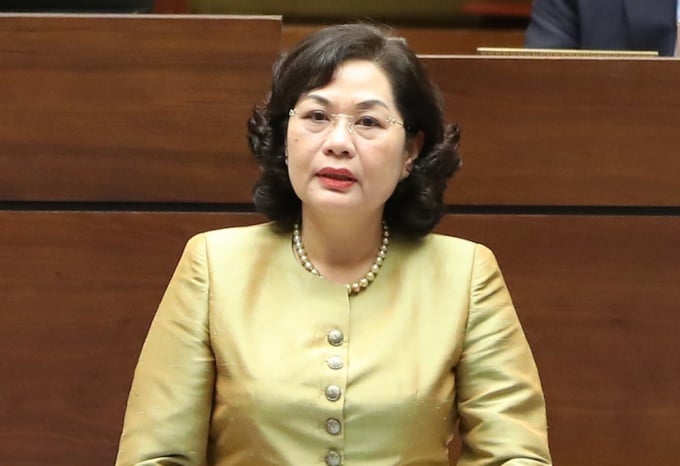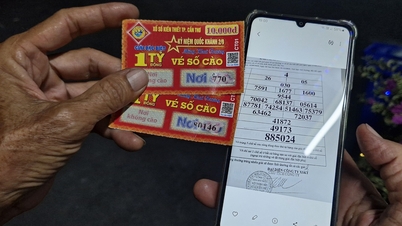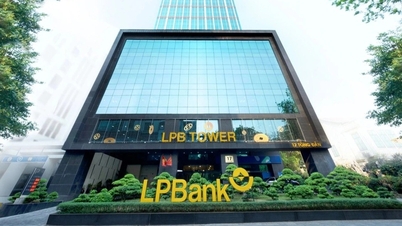Governor Nguyen Thi Hong said early intervention with support measures such as special loans with 0% interest rates aims to prevent banks from being hit by mass withdrawals.
The draft Law on Credit Institutions (amended) submitted to the National Assembly this time adds a provision that credit institutions are allowed early intervention by the State Bank.
Accordingly, banks are in the case of early intervention when they are subject to mass withdrawals leading to insolvency, or credit institutions cannot maintain payment ratios and capital safety for 3 and 6 consecutive months, respectively, and have accumulated losses greater than 20% of the value of charter capital and reserve funds. One of the measures applied to this group is special loans, without collateral, with an interest rate of 0% per year from the State Bank, Deposit Insurance and other banks.
Discussing on June 10, Mr. Pham Van Hoa ( Dong Thap ) proposed to clarify the extent of the mass withdrawals that require the intervention of the State Bank. This is to ensure transparency, timeliness, and avoid risks like the mass withdrawals at Saigon Bank - SCB last October.
Explaining later, State Bank Governor Nguyen Thi Hong said that the current law has early intervention measures but the time limit is one year, without accompanying support measures, so Ms. Hong said that in reality, it is difficult to implement. For example, in the case of SCB, other credit institutions want to support, but the law does not have specific regulations, so "they do not dare because it is related to the risks of loans".
"In normal banks, there may be some reason why there is still a mass withdrawal incident, so early intervention will be put into place. In the case of banks under special control, this is a very difficult period, and if support solutions are not implemented, it will be difficult to ensure the safety of the banking system," she explained.
Therefore, early intervention measures were introduced to prevent the risk of bank runs.

Ms. Nguyen Thi Hong, Governor of the State Bank, explained to the National Assembly on June 10. Photo: Hoang Phong
The State Bank leaders also cited international experience, not waiting for credit institutions to face liquidity difficulties before handling them. For example, US banks have total assets of over 200 billion USD, low bad debt of just under 1%, and risk reserves compared to the value of bad debt 4-6 times higher, but are still at risk of mass withdrawals. In just a few days, these banks had up to 100 billion USD withdrawn, forced to receive support from the Central Bank and loans of tens of billions of USD from other banks.
Accordingly, in this revision, early intervention measures are designed based on the reality of difficulties in restructuring weak banks, the mass withdrawal event at SCB and referring to the experience from the recent collapse of banks in the US.
"The regulations on early intervention are designed to mobilize support resources, increase banks' responsibility for system safety, and reduce financial costs in handling incidents of credit institutions," said Ms. Hong.
According to Governor Nguyen Thi Hong, it is inevitable that banks will encounter difficult times during their operations. During the inspection and supervision process, the management agency will warn of risks so that they can make timely adjustments. In case of a bad development, with the risk of losing the ability to pay to the people, the level of management and intervention will be stronger.
Expressing her previous opinion, Ms. Pham Thi Thanh Mai, Deputy Head of the Hanoi delegation, said that there should be additional regulations on the time limit for early intervention and corresponding plans if the bank cannot recover after the time limit for being placed under special control.
"Banks apply early intervention measures and report quarterly on the implementation of remedial measures to ensure the urgency and effectiveness of early intervention," said Ms. Mai.
With special loans for banks at risk of mass withdrawals , delegates proposed to stipulate that credit institutions that borrow this special loan must postpone the loan until the debt is recovered from the customer and then repaid. This is to ensure fairness with banks that operate effectively.
Mr. Pham Van Hoa also suggested that there must be collateral for special loans, which are the collateral that customers deposit with banks. "There is no reason why customers must have collateral to be granted credit, and banks that offer special loans do not have to mortgage assets," he stated.
The issue of special loans to illiquid banks requiring collateral was also raised by the Economic Committee when examining the draft law.
The review body requested clarification of the basis for proposing measures to designate special loans and assess the impact of these loans on designated credit institutions. In the case of designating a number of banks for special loans, the Economic Committee believes that it is necessary to clarify the basis for selection and allocation of loan amounts.
Source link


![[Photo] Binh Trieu 1 Bridge has been completed, raised by 1.1m, and will open to traffic at the end of November.](https://vphoto.vietnam.vn/thumb/1200x675/vietnam/resource/IMAGE/2025/10/2/a6549e2a3b5848a1ba76a1ded6141fae)





































































































Comment (0)